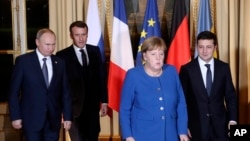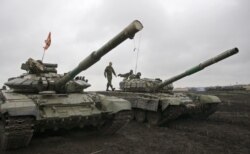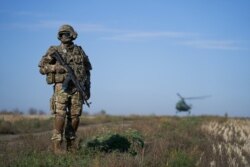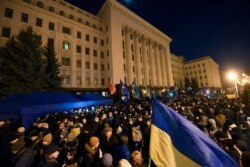Russian President Vladimir Putin and his Ukrainian counterpart, Volodymyr Zelenskiy, are meeting for the first time in Paris for long-awaited talks on resolving the military conflict in eastern Ukraine that has left more than 13,000 people dead since 2014.
After a series of bilateral meetings at the Elysee Palace on December 9, Putin and Zelenskiy sat down together with French President Emmanuel Macron and German Chancellor Angela Merkel.
The leaders entered the room without smiling and making little eye contact with each other. They did not shake hands for the cameras.
The four-way talks in the so-called Normandy Format is the first time the heads of Ukraine and Russia have met since 2016 and the first meeting ever between Zelenskiy, who was elected in April, and Putin.
The International Criminal Court (ICC) ruled in November 2016 that the war in eastern Ukraine was "an international armed conflict between Ukraine and the Russian Federation."
All sides have made efforts to moderate expectations of a breakthrough in the run-up to the summit. The Kremlin wants to maintain as much influence over Kyiv as it can, using the land held by the separatists it supports in the Donbas as a lever. The Ukrainian president must balance the benefits of progress toward peace with the potentially disastrous risk of being seen as surrendering to Moscow.
Russian Foreign Minister Sergey Lavrov said on Dec. 6 in Rome that Moscow expects "additional agreements that will help eliminate this conflict."
He added that Moscow was seeking "to really ensure the security of the people of the Donbas, to guarantee their rights as set forth in the Minsk agreements, and to stop this conflict."
The Minsk agreements on creating a road map to resolve the conflict were reached in the Belarusian capital in 2014 and 2015. The accords call for a cease-fire, the withdrawal of heavy weaponry, the restoration of Kyiv's control over all Ukraine's borders, a law on special status for the territory controlled by the Moscow-backed separatists, and the holding of elections on that territory.
However, their implementation has been largely stymied.
The path to the Dec. 9 summit was smoothed in part by a large exchange of prisoners in September and by Moscow's return to Kyiv in November of three Ukrainian naval vessels Russia had seized in the Black Sea in late 2018.
In addition, the two countries agreed in October to withdraw from three flash points along the front line, two in the Luhansk region and one in Donetsk.
Zelenskiy, for his part, said earlier this month that the mere fact the talks had restarted was his "first victory" in efforts to end the war.
He has said previously that he will push three main ideas in Paris: a further exchange of prisoners, implementing a cease-fire agreement, and the disbanding of "illegal armed formations" in Ukraine.
Zelenskiy visited front-line troops Dec. 6, telling the soldiers "it is a lot easier to hold talks while feeling your strength and your support behind me."
The Kremlin has said that Putin plans a one-on-one meeting with Zelenskiy. Kyiv, however, has said only that such an encounter is under consideration.
Former Ukrainian President Petro Poroshenko on Dec. 6 posted online a statement advising Zelenskiy not to meet directly with Putin.
"Do not trust Putin," he recommended. "Never and in nothing." He warned his successor that Putin will use "KGB-style manipulations, flattery, and play on the president's emotions and flaws."
In Kyiv on Dec. 8, thousands of people demonstrated under Ukrainian flags on Independence Square to warn Zelenskiy to avoid crossing any "red lines" in the negotiations.
They cited the need to maintain territorial integrity and avoid federalization, to keep up Ukraine's pro-European course, to steer clear of actions to legitimize the occupation of Ukrainian territory, to insist on the return of Russian-occupied Crimea, and to keep open the possibility of lawsuits filed internationally over Russia's actions in Ukraine.
The Paris meeting comes amid strikes and sometimes-violent social protests in the French capital and other cities that have snarled the country's transportation network. At least 800,000 people marched Dec. 5 in Paris, and police used tear gas several times.
The Kremlin said Dec. 6 that Putin was not concerned about the situation and that France could "successfully" host the summit.
In addition, Ukraine has been at the center of impeachment hearings in the U.S. House of Representatives against U.S. President Donald Trump, in an unfolding political drama that has raised questions about long-standing U.S. support for Kyiv at a time when officials, diplomats, and analysts say it needs it most.
European Commission spokesman Peter Stano told Ukrinform Dec 6 that although the European Union was not a party to the Normandy Format, "we strongly support this format and the implementation of the Minsk agreements."
The conflict in eastern Ukraine broke out in early 2014, shortly after Russia illegally annexed the Ukrainian Black Sea region of Crimea.







